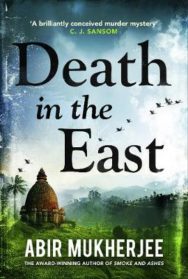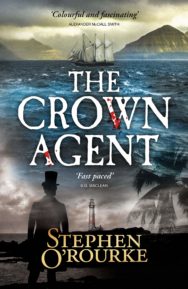‘Some stories can never be told. Some mysteries are so rooted in darkness they can never be set down, even now, here in my study, where a cheerful fire crackles in the hearth.’
David Robinson takes a look two new historical thrillers, and appreciates their masterly world building and page turning plots.
The Crown Agent
By Stephen O’Rourke
Published by Sandstone Press
Death in the East
By Abir Mukherjee
Published by Harvill Secker
At the end of Ian Rankin’s latest Inspector Rebus novel In a House of Lies, there’s a brief mention of the notorious nineteenth century Edinburgh murderers Burke and Hare. The former was, of course hanged, and his skin forms the binding of a notebook on display at Edinburgh’s Surgeons’ Hall Museums. But Hare is the interesting one. In exchange for giving evidence against his friend, he was released. According to Rankin, Rebus and Wikipedia, he fled south, someone blinded him and he spent the rest of his days begging.
The fact is, nobody really knows what happened. The story of Hare’s blinding may only be, as historian Owen Dudley Edwards has argued, a Victorian morality tale to prove that, in Rebus’s words, ‘nobody every really gets away with it’. But novelists were never going to leave such a fascinating vacuum unfilled. Five years ago, for example, Scottish journalist Peter Ranscombe’s debut novel Hare imagined him not only living on for decades but playing a vital role in the American Civil War.
The latest novelist to work Hare into his story is Stephen O’Rourke, a Greenock-born lawyer (a QC, no less) whose first novel The Crown Agent introduces us to disillusioned doctor Mungo Lyon. It’s 1829, Burke has just been hanged, but because of the revulsion against Lyon’s mentor, Robert Knox (who bought the bodies Burke and Hare supplied him for use in anatomy lessons), he is unable to practise as a surgeon. When the Lord Advocate asks him to turn detective and find out more about schooner Julietta, which has been found adrift on the Firth of Clyde with all of her crew dead of yellow fever, he agrees immediately.
Already the reader knows that some sort of game is afoot, because the novel’s prologue had a lighthouse keeper being murdered in the middle of a storm just as he was about to light a beacon to help a stricken ship (the Julietta?) a mile off Cumbrae. Three days later, a customs officer disappeared from Campbeltown, so perhaps the Julietta had been smuggling something from the Caribbean. But what?
Second question: whatever the illicit cargo, where was it landed? Third, whom did it benefit? Lyon has to work out whether any of the four main landowners on that part of the coast were involved, and if so, why. Fourth question: who are the four men pursuing Lyon right from the start working for? Fifth: can Hare – whom Lyon meets in Greenock at the start of his mission – really be trusted?
The Crown Agent has its roots in a short story O’Rourke submitted for a Daily Telegraph competition in 2012. It won, and from the novel one can easily guess what the judges saw in it. O’Rourke writes well, the plot has an engaging complexity, and it is generally free of anachronisms (although I’m not sure whether Lyon’s family home in Edinburgh’s Morningside Place would have been built by 1829). Generally, though, he is spot-on: the Glasgow Lyon passes through is already booming, even though steel and shipbuilding haven’t yet arrived, and the onward journey to Greenock is possible by steamship but not (yet) by train. The journey across from Edinburgh is still most comfortably done on the canal that Burke and Hare came over from Ireland to dig, so Lyon does just that, ‘drifting asleep to the clop of Clydesdales hauling me west’ with his pistol in his medical bag next to his bunk.
Night Barge to Falkirk. At this early point in the story, that would have made sense as a title – indeed, I’d like to have had more quiet moments like that, where we could get to know Lyon better. Because when the plot starts again it’s as loud, insistent and colourful as a cinema advert. Lyon – who boasts early on that he ‘can amputate a limb in 48 seconds with the patient unconscious, slightly longer if not’ – will get plenty of opportunities to do just that in a storyline that, as well as everything I’ve already mentioned, also takes in kidnapping, insurrection, a masked ball, murders and deaths galore and trawlerfuls of red herrings. It’s a rich mix, but if you love unadulterated adventure stories, Mungo Lyon could be well worth following.
The year after O’Rourke won that Daily Telegraph short story competition, another Scot won. Abir Mukherjee turned his winning tale into his debut novel A Rising Man, which went on to win yet more awards. I haven’t yet read it, but now want to, because his fourth – Death in the East – is one of the most enjoyable historical thrillers I have read for a long time.
In the books, Mukherjee pairs Captain Sam Wyndham, who becomes a detective in Calcutta after surviving the First World War, with Sergeant Surendranath Banerjee (or “Surrender-Not” as he is invariably called by imperialist Brits). It’s after World War One, Calcutta has only relatively recently lost its status to New Delhi as the capital of the Raj but is still its main economic hub, and Gandhi’s campaign for independence is about to begin. A fascinating time, and an intriguing place, both barely explored by crime fiction.
In relation to crime novels set in the present, those set in the past always makes me think of that great line about Ginger Rogers having to do everything Fred Astaire did ‘except backwards and in high heels’. If it’s hard enough to get the present right, it’s even harder to bring the past to life, and populate it with characters who don’t feel as though they are our contemporaries. Racist attitudes being what they were in the early 1920s, you might briefly wonder whether Wyndham is just being a bit too ‘woke’ for his own good in his friendship with Banerjee. Or vice-versa, come to that: wouldn’t Bannerjee’s affection for Wyndham be similarly unlikely?
The trick Mukherjee pulls off is to make those questions irrelevant, so convincingly does he write about character, and so subtly about his book’s historical setting. It helps, of course, that Wyndham isn’t your traditional Raj stiff upper-lipper, but at the start of this book a paranoid opium addict undergoing detox at an ashram in the Assam hills. As for Banerjee, that nickname is just about perfect: yes, it’s racist not to call him by his proper name, but there’s a certain implicit respect in the nickname too.
Although half of the book is set in 1922 Assam, Death in the East actually gains a lot of its impact from the story of a murder in the East End of London in 1905, where Wyndham served as a constable. When the main suspect turns out to be Jewish, a great deal of what Mukherjee wants to say about racism in the Raj already applies here in anti-semitism stoked by Daily Mail-type newspapers (I caught myself thinking what a great name – Harmsworth – he had invented for one such hack before I realised that, of course, he hadn’t.) The murder victim is a former girlfriend of Wyndham’s and his attempt to solve the case reveals a great deal about his character, not all of it to his credit. On top of that, the case is a classic locked room mystery, which turns out to be mirrored in a similar one in Assam. So: not just excellent characterisation and historical credibility (and, I should add, witty narration too), but bravura plotting as well.
In interviews, Mukherjee has admitted that his Wyndham and Banerjee books owe a great deal to Martin Cruz Smith’s Arkady Renko novels or Philip Kerr’s Bernie Gunther series in which good men uphold systems they don’t believe in. He’s right: they do, and yet his pairing of detectives from such different backgrounds allows for an even greater degree of cultural and political understanding. But those are the standards by which Death in the East should be judged, and it more than matches them. I wouldn’t be remotely surprised if it goes on to win the McIlvanney Prize as best Scottish Crime Book of the Year at 2020’s Bloody Scotland. Yes, that good.
The Crown Agent by Stephen O’Rourke is published by Sandstone Press, priced £14.99
Death in the East by Abir Mukherjee is published by Harvill Secker, priced £12.99
ALSO IN THIS ISSUE

 Literary Devolutions
Literary Devolutions
‘How late it was, how late is a heroic monument to the freedom and resilience of the individual subj …















